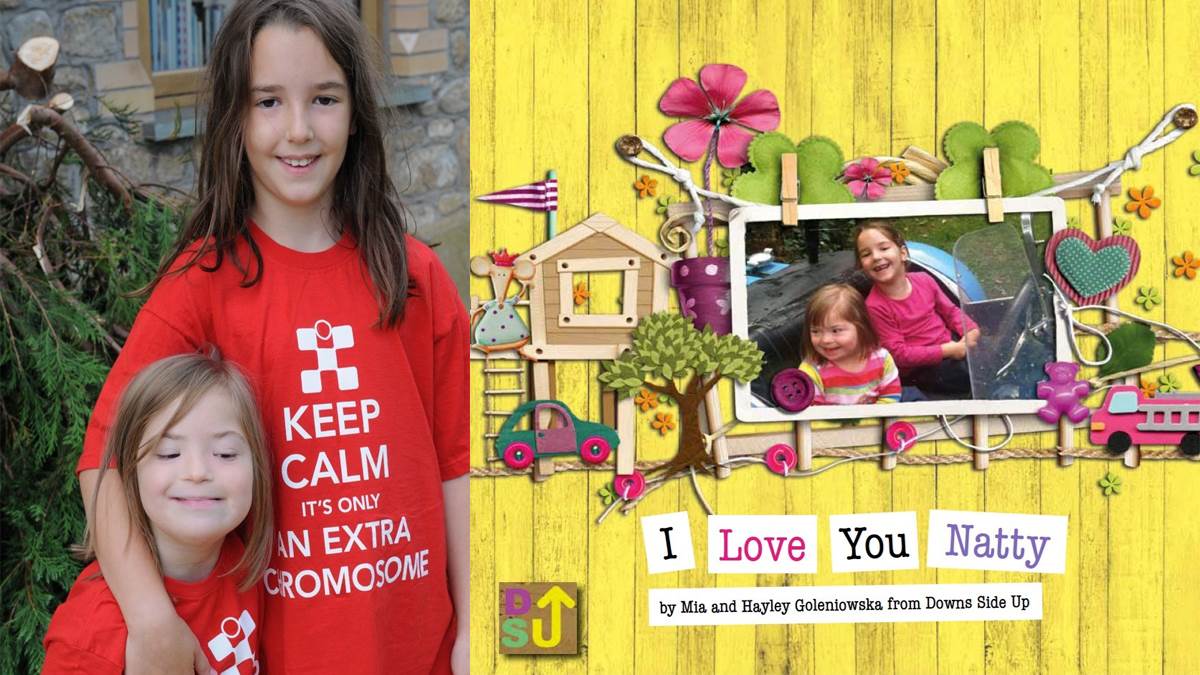'I love you, Natty': sharing our experience of Down’s Syndrome
Published on: 17 March 2017 Author: Alex Strick
Just over ten years ago, Hayley Goleniowska's little girl was born with Down's syndrome. Hayley talks to us about writing a children's book with her older daughter about family life - and how that book is filled with love and hope.

World Down Syndrome Day takes place every March 21st: representing the three copies of chromosome 21 in every person with Down's syndrome.
It is a day for educating, sharing resources, celebrating, sometimes fundraising and joining together with others from our community around the world.
'A period of adjustment'
Just over ten years ago, our youngest daughter Natalia was born. Down's syndrome and a heart condition were identified shortly afterwards - and what followed was a period of adjustment, shock, worry and a spell in intensive care.
I desperately sought a book to sit and read with our eldest daughter Mia (then two), to explain why Mummy and Daddy often had tears in their eyes, to explain that Mia could help look after the new baby and they would have lots of fun together. The books I found were either outdated or written in American English, and so I stored the seed of an idea to one day create exactly the type of book we were searching for ourselves.
And I did.
Welcoming a new baby
Mia was seven years old when we found a beautiful note left in her sister's bedroom. It read 'Natty, you are so important to me and my life would not be the same without you in it'. It was accompanied by a drawing of the family.
I immediately knew that this was the starting point; the basis of something that could help new parents, brothers, sisters, cousins and classmates welcome a new baby with Trisomy 21 into their lives.
Mia's drawings and even her handwriting have been preserved, along with family photographs, into my book I Love You Natty.
'Love and hope'
We wanted to create something bright, visually appealing and positive, but not shy away from the realities of heart surgery or Natty's stay in an incubator as a newborn. It's important to be realistic and not play into stereotypes or sugar-coat representations of disability in writing.
I felt too that children were more likely to listen to the voice of a peer speaking to them through the pages. That is why I provided a structure for the rest of the book, which was written through a kind of 'guided writing', whereby I asked Mia questions and she wrote her answers.
The book covers what Down's syndrome actually is, plus some of the early interventions that have helped Natty reach her potential, as well as signposting a variety of support groups and charities.
But what shines through is love and hope.
Ordinary family doing ordinary things
The major charities read and approved the book and with help from a local designer and a kindly printer, we were able to self-publish. I was determined that it should be affordable and available to as many families as possible.
I've been overwhelmed by the many stories of children who don't even know anyone with Down's syndrome insisting on reading our book every night. What also surprised us is that children with the condition love seeing someone they can identify with being represented in a book they enjoy.
Siblings love that someone has thought about their needs too, and other children enjoy learning about our similarities and differences. After all, we all need to see ourselves represented in literature, regardless of our abilities, race, gender or sexuality.
What surprised me less is that parents themselves want a book like this. They want to see our ordinary family doing ordinary things, while they are gently helped to develop the confidence and knowledge that they too will adjust, accept and find their way.
Life will be wonderful, it will just take a slightly different path.
Sowing the seeds of inclusion
I Love You Natty has now sold around the world and is gifted to new families by many hospitals and support groups. It is sowing the seeds of inclusion everywhere. It's on its second print run now and we are now working on a second title, written from Natty's perspective. I do hope that both books will be relevant for many years to come.
I also hope it will inspire other writers, illustrators and publishers to include Down's syndrome naturally and positively.
Topics: Bookmark, Down’s Syndrome, Features





